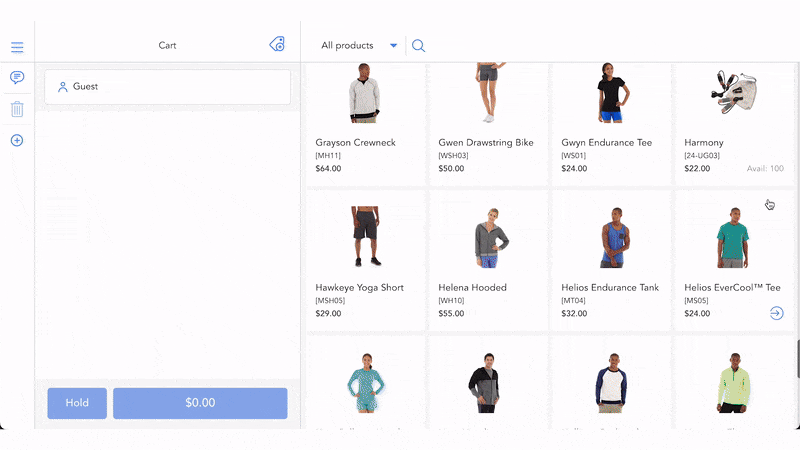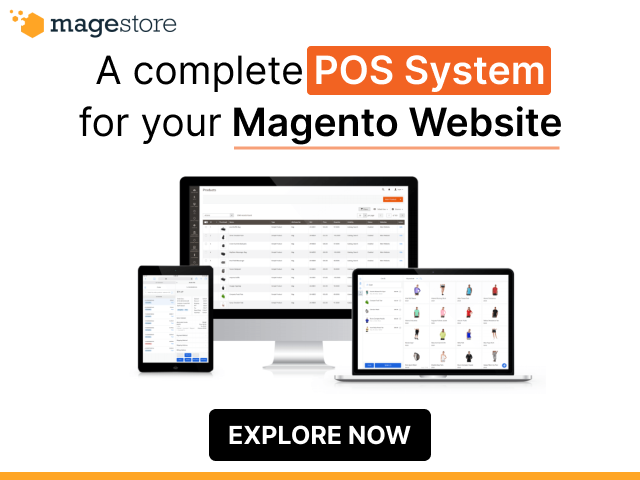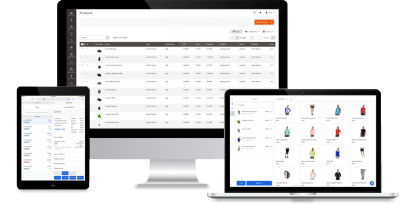Just a few years ago, it would have cost you a fortune to make an eCommerce website. Luckily with the rise of eCommerce, you can now build a beautiful and robust online store in a wink. Some eCommerce platforms are bundled with content management systems while others are stand-alone platforms that include only what is needed to sell.
Whether you’re a startup or looking for a solution to expand, an eCommerce platform has a huge impact on the stability and profitability of your business. This article compares the 4 most popular and best eCommerce platforms in 2025 to help retailers choose the most suitable solution for your online business.
What is an eCommerce platform?
An eCommerce platform is a solution for online businesses to handle the process of selling and buying online on your website. This includes sales, marketing, and operations with 3 basics features:
- Search: to find desired products
- Shopping cart: to manage orders
- Checkout: to complete the purchase
Since online customers can’t touch and feel products, the best eCommerce platform will make it easy to:
- Return the search results related to your website to customers
- Present products in clear and attractive ways
- Assist customers in finding products more quickly
It should be able to grab your customers’ attention from a wide selection of vendors on the market and deliver a great customer experience.

Types of eCommerce platform
Based on the type of deployments, there are 3 main eCommerce platform options:
- SaaS (software-as-a-service): an on-demand platform that is centrally hosted and licensed on a subscription basis
- Open source: a platform whose license includes the open source code for further customization
- Headless commerce: an architecture in which the interface of the user end (head) is separated from the functionality of the commercial end. Therefore, you can edit and update it without interfering with the frontend.
Key things to consider with an eCommerce platform
Determining the criteria before choosing the best eCommerce platform for your business is very important. If you choose wrongly, the conversion will cost you a lot of effort, time, and money, and service disruption for your customers. Before committing to a certain platform, you should do some research in advance based on the following 7 factors:
1. Pricing vs. your budget
Cheap options often cost you extra for advanced features and functionality. However, paying more doesn’t always lead to a better experience. Even with the best eCommerce platform packages, you still need to understand what you’re really getting to see if they’re cost-effective. Merchants should figure out the desired budget for:
- Licensing
- Monthly hosting
- Maintenance
- Programming and functionality
- Web design
- Security
If you choose independent web hosting, you will need extra fees for services from other providers. But if you choose an all-in-one host, you’ll often have the option of a premium plan that includes all the features. Whichever option you choose, compare the total cost with your budget.
2. Payment processing
Having a variety of payment options increases the likelihood that customers complete their purchase and reduces the hassle of the checkout process. If your website is international, the best eCommerce platform should accept or be able to integrate with local payment gateways in addition to popular options like Stripe, PayPal, and Apple Pay.

3. Analytics
To know if your website is performing well, you should choose the best online platform with built-in analytics. That helps you easily track important eCommerce metrics to your business such as churn rate, sales conversion rate, average order value, and customer lifetime value. At the very least, the platform you choose should be able to integrate with third-party eCommerce analytics.
4. SEO-friendly
Not every customer knows about the existence of your eCommerce store. To increase discovery, your website needs to appear in search results not only for your brand name but also keywords related to your products and services. To achieve this, you should find the most SEO-friendly eCommerce platform to:
- Add content or blog to drive organic traffic
- Have the ability to customize your domain name
- Allow and publish visitors reviews
5. Mobile-friendly
Customers are increasingly using mobile devices to make purchases. It’s important to create a mobile-friendly eCommerce store so that customers can easily browse and purchase from their mobile devices. You can read more in our article Understanding mobile commerce: What, why, and how.
6. Integrations and apps
Integration and application capabilities are important factors when looking for the best eCommerce platform. They help to extend the functionality of the eCommerce platform at any time as the business expands in the future. Additionally, you’ll want to make sure your eCommerce platform works with the solutions you already use, like inventory management, email marketing, and accounting tools.

7. Support
You’ll sometimes still need technical support even with the easiest-to-use eCommerce platform. Here we consider the availability of support options and the quick resolution time. In addition to self-help channels like community forum or knowledge base, your eCommerce provider should have many options like email, phone, and live support.
Top 4 eCommerce platforms in 2025
According to Builtwith’s most recent report, WooCommerce, Shopify, and Magento account for the biggest market shares among the top 1 million eCommerce sites:

However, different platforms may fit different types of businesses and growth stages. In this section, we’ll assist you in finding the best eCommerce platform for your business needs, by looking at top leaders of the eCommerce industry. Most of these platforms have a plugin store or app store that provides additional functionality and features beyond the core platform.
Shopify — best eCommerce platform for startups

Highlights
- High ease of use
- Pre-filled design that can be modified
- Integrated POS system
Pricing
- Basic Shopify: $29 per month
- Shopify: $79 per month
- Advanced Shopify: $299 per month
Payment processing
- You can use their own developed payment gateway called Shopify Payments, which is available in the U.K, the U.S., Canada, Australia, New Zealand, Hong Kong, Singapore, Japan, and some European countries.
- If you don’t use Shopify Payments, additional fees will depend on your chosen Shopify plan with extra fees of up to 2%. Shopify integrates with 100 international payment gateways such as Stripe, PayPal, 2Checkout, and Authorize.net.
Analytics

With Shopify’s Basic plan, you’ll have:
- Real-time reports
- Overview of orders, sessions, and sales reports
- Finance reports of payments, sales, and taxes
- Inventory reports (an end-of-month snapshot and percentage of sold inventory sold)
- Acquisition reports
- Customer behavior reports (conversion rates and checkout rates)
- Campaigns analytics
With Shopify and Advanced Shopify, you can create custom reports and connect to Google Analytics.
SEO-friendly
Shopify provides most of the SEO parameters such as built-in CMS, title, image alt-text, descriptions, tags, and blogging functionality. When you change your domain URL, it will create optional redirects automatically.
However, you can’t customize the robots.txt file because it’s automatically generated. Also, it has limitations on creating non-eCommerce content and difficulty in creating subcategories.
Mobile-friendly
Shopify delivers a mobile-friendly customer experience for online shopping with:
- An built-in m-commerce shopping cart
- A responsive theme
- Secure payments
Integrations

Shopify has more than 2,400 apps in the Shopify App Store. Besides paid apps, many of them are free. Most are developed by 3rd-parties and some are built by Shopify.
Support
- Documents, guides, and tutorials for self-help
- 24/7 support via email, phone, and live chat in case of technical support
You might like: Shopify POS Integration: Which POS systems work with Shopify?
WooCommerce — best eCommerce platform for small businesses with a site on WordPress

Highlights
- WooCommerce is the most popular eCommerce platform in the U.S.
- Open source and customizable eCommerce platform
- Easy to get used to if you’re already using WordPress. This is because WooCommerce is built on WordPress and can run behind a WordPress site.
- Support unlimited product variants and products
Pricing
WooCommerce itself is free but its add-ons and extensions will cost you, even for basic features like payment gateways, email tracking, or shipping.
Payment processing
WooCommerce requires an extra fee to work with popular payment options such as Stripe, Authorize.net, PayPal, Braintree, and Amazon.
Analytics

- Provide built-in reports about site views, customers, orders, inventory, downloaded files, and taxes
- Integrate with Google Analytics by default
SEO-friendly
- Inherit all SEO capability and robust content management system from WordPress
- Work with SEO plugins such as Yoast and All in One SEO Pack
- Allow adding snippets to boost ranking Google Search Engine
Mobile-friendly
By default, WooCommerce provides a few templates optimized for mobile experience. If you have technical skills or resources, you can customize your own template.
Integrations

WooCommerce has thousands of apps, plugins, and extensions for additional functionality but most of them aren’t free.
Support
- Guides and tutorials
- Advice from technical communities who develop its plugins or store owners who use the platform
- Note: You’ll need to hire your own developer in case you need direct technical support.
Magento — most popular open source and best eCommerce platform overall

Highlights
- Best eCommerce platform for online businesses to develop professional website and customer experience
- Most powerful eCommerce platforms for dropshipping
- Provide an in-depth feature list and an extensive backend interface
- Customizable and scalable to align with eCommerce growth
Pricing
- Magento Open Source: Free
- Magento Commerce: Custom quotation based on the business’s gross sales revenue
Payment processing
Magento accepts checks and money by default. For credit card payments, it requires you to add payment gateways. Magento has an built-in Braintree (PayPal) payment processor. You can integrate with other payment options such as Square or Stripe through APIs.
>>> Might you like: #1 Customizable and scalable Braintree POS for medium to large retail enterprises
Analytics

Magento has powerful reporting features that cover almost everything of store operation, including 5 main types:
- Review reports
- Marketing reports
- Product reports
- Customer reports
- Sales reports

You can also integrate Magento with Google Analytics easily for deeper customer behavior and website performance insights. When Adobe acquired Magento in 2018, they built the Commerce Cloud version that is part of the Adobe Experience Cloud.
SEO-friendly
- Provide full control with all kind of URLs
- Generate Google sitemap automatically
- Allow editing meta descriptions, meta keywords, adding rich snippets, and many other things to improve your site’s SEO
Mobile-friendly
Magento allows you to maximize the experience and engagement with your customers on mobile with:
- Fully responsive theme
- An easy-to-use and intuitive storefront and optimized checkout process for mobile
- The most advanced web standard for mobile — Progressive web applications (PWA)
Integrations

Magento provides almost 4,000 extensions to meet all kinds of your eCommerce needs across different categories, such as:
- Site optimization
- Marketing
- Sales
- Shipping and fulfillment
- Payments and security
- Reporting and analytics
- Customer support
- Content and customizations
- Accounting and finance
Support
- Rich knowledge base, user guide, webinars, tutorials, and developer docs as DIY resources
- 24/7 support via email, live chat, and phone
BigCommerce — best eCommerce platform for sophisticated enterprise-grade business

Highlights
- Provide flexible and open SaaS platform with 2 options:
- A DIY SaaS platform: BigCommerce Essentials
- A customized experience for large business: BigCommerce Enterprise
- Easy to use but it divides into two separate areas to manage your store’s backend:
- In one area, you can add products, manage discounts and deliveries.
- Another area allows you to edit your storefront.
- One attempt to ease the problem of having to go back and forth between the 2 areas is that it has a Store Designer tool, which is very easy to design and customize your storefront.
Pricing
- Standard: $29.95 per month
- Plus: $79.95 per month
- Pro: $299.95 per month
- Enterprise: Custom quote
Payment processing
BigCommerce accepts a wide range of online payment methods and even digital wallets. It requires no additional fees per transaction. You only need to pay the transaction fee for the gateway providers.
Analytics

BigCommerce provides strong reports to handle big stores, such as:
- Real-time analytics for customers and sales orders
- Marketing reports
- Integration with Google Analytics
SEO-friendly
- Allow customizing meta-descriptions, title tags, and all kind of URL except for blog posts
- Allow editing robots.txt and metadata
- Provide 301 redirects and sitemaps
Mobile-friendly
Most themes of BigCommerce are optimized for mobile and user-friendly.
Integrations

BigCommerce has more than 800 additional apps in its app store, including POS, sales tax, marketing, and accounting. Also, it has a RESTful API so you can make your own integration with anything you want.
Support
- Community forum and knowledge base
- 24/7 support via email, live chat, and telephone
How to decide the best eCommerce platform for my business
Once you have clearly defined your platform options, you can answer the following questions to make a more informed decision:
- How much does it all cost? Including website hosting fee, eCommerce platform costs, and custom domain name purchase price?
- Will it be able to expand to support the growth of my business in the future?
- Is the design flexible? Can I customize it to get exactly my desired look for the storefront?
- Does the platform limit the number of products I can add to the store? And is the process easy and convenient?
- Is its theme responsive based on the customer’s devices from desktop to mobile?
- What’s the ability to integrate with my existing business systems, like POS systems, accounting, and shipping systems? Or do I need to use a third party to build integrations?
Final words
You can take a glance at Google Trends over the past 5 years for the best online store eCommerce and recognize an interesting insight: Shopify has the highest search volume but only Magento has an upward trend among the 4 options in recent months.

We understand that the needs of your website will inevitably change with each stage of your store’s growth.
You may want to consider switching to a large-size business platform like BigCommerce when your store grows rapidly in the future.
However, if you need a great start at a reasonable cost, and sustainable development with strong scalability into the future, Magento is the surest answer as the best eCommerce platform.
With all of Magento’s built-in features, you’ll have a modern template as the basis for your store design and operation, powerful report, and SEO control to help you get the most out of your budget.
If Magento’s your choice moving forward, Magestore can help you set up a complete retail system right from your Magento site. With our eCommerce solution, Magento POS, and system operation service, merchants can focus on selling and winning customers.














